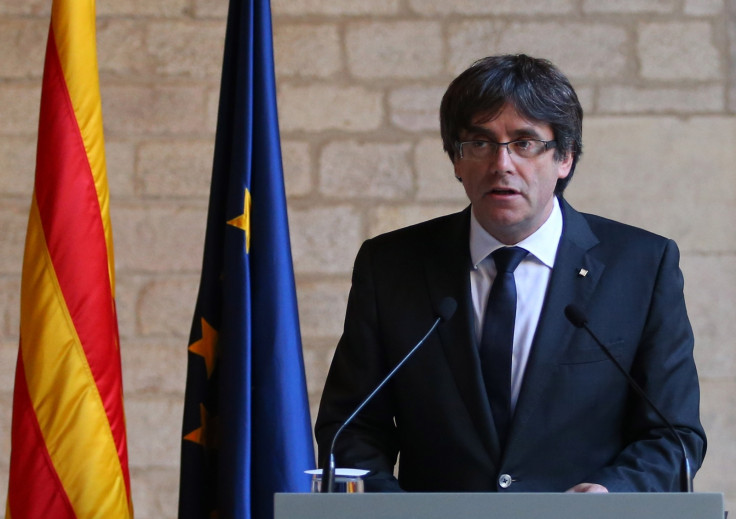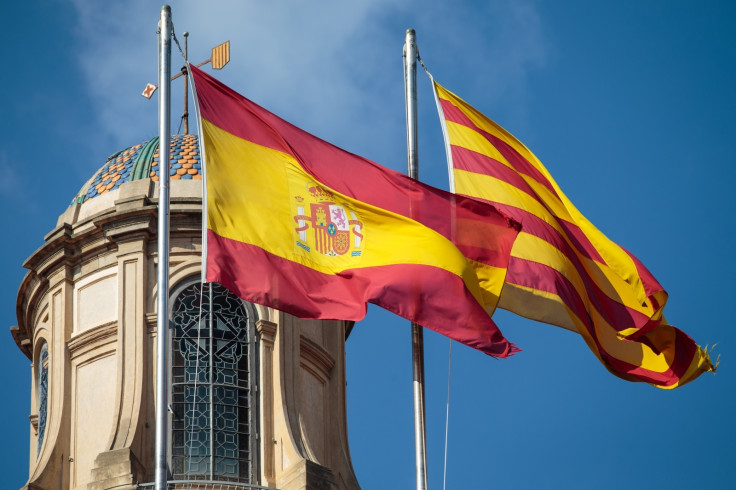Ousted Catalan leader vows to fight Spanish government takeover
Spain took formal direct control of Catalonia a day after lawmakers passed a declaration of independence for the prosperous northeastern region.
Catalonia's ousted separatist president on Saturday called on Catalans to peacefully oppose Spain's imposition of direct rule in the region, in a veiled refusal to accept his Cabinet's dismissal as ordered by central authorities.
Spain took formal direct control of Catalonia on Saturday, dismissing the region's defiant separatist government, including Catalan leader Carles Puigdemont, a day after lawmakers passed a declaration of independence for the prosperous northeastern region.
The move came after one of the most tumultuous days in the country's recent history, as the national parliament in Madrid approved unprecedented constitutional measures to halt the secessionist drive by the regional parliament in Barcelona.
Spanish Prime Minister Mariano Rajoy also dissolved the regional parliament and called a new regional election to be held on Dec. 21.
In a pre-recorded televised statement, Puigdemont said only the regional parliament can elect or dismiss the Catalan government, vowing to "continue working to build a free country."
"The best way we have to defend the achievements to date is the democratic opposition to the application of Article 155," Puigdemont said in reference to the constitutional clause that gave Madrid direct control of affairs in Catalonia.

Despite his defiant tone and the use of the official Catalan government emblem, the Catalan and European Union flags but no sign of the Spanish one, some political commentator saw in his mention of "democratic opposition" as laying the groundwork for political campaigning for the regional election in less than two months.
"Our will is to continue working to fulfill the democratic mandates and at the same time seek the maximum stability and tranquility," Puigdemont said. Separatists argue that a controversial victory in a banned Oct. 1 referendum legitimizes them to split from Spain.
After Spain's central authorities made the takeover official early Saturday, Puigdemont and the 12 members that until Saturday made up the Catalan Cabinet are in theory no longer paid.
Spain's government has said they could be charged with usurping others' functions if they refuse to obey, which could throw the region into further turmoil by prolonging a monthlong standoff.
It's not clear at all whether a new election would solve Spain's problems with separatists in Catalonia. Polls suggest pro-independence parties would likely maintain their slim advantage in parliamentary seats but wouldn't get more than 50 percent of the vote.
Rajoy said the declaration of independence "not only goes against the law but is a criminal act."
His comments were met late Friday with jeers and whistles of disapproval in Barcelona, the main city in Catalonia, where thousands had gathered to toast the independence declaration.
There was no immediate sign they intended to comply with the orders. The Catalan Cabinet met Friday. but didn't make any public appearances or offer statements following Rajoy's announcement of the planned government takeover. Spanish prosecutors say that top Catalan officials could face rebellion charges as soon as Monday.
Beyond any possible resistance from top Catalan officials, it's unclear how Rajoy's government in Madrid will be able to exert its control at lower levels of Catalonia's vast regional administration.

Catalonia had secured the ability to govern itself in many areas, including education, health and policing, since democracy returned to Spain following the death of dictator Gen. Francisco Franco in 1975.
Some among Catalonia's roughly 200,000 civil servants have said they will refuse to obey orders from Madrid. They risk being punished or even fired under the special powers granted to central authorities by the nation's Senate on Friday.
Vice President Soraya Saenz de Santamaria will be Rajoy's point person in running Catalonia until the new regional election on Dec. 21. She will coordinate other ministries that take over functions of Catalonia's regional departments, including finances and security, and appoint officials to implement orders from Madrid.
In one of the first moves, Spain's Interior Ministry published an order to demote Josep Lluis Trapero from his position as head of the regional Mossos d'Esquadra police in Catalonia. He will be allowed to remain as commissar.
Trapero became a controversial figure as the public face of the police response in mid-August to deadly extremists' attacks in and near Barcelona. He was praised for effectiveness but also criticized for coordination problems with other national police forces.
Spain's National Court is also investigating him as part of a sedition probe related to the banned Oct. 1 independence referendum, when the regional police were seen as acting passively — not aggressively — to halt the vote deemed illegal by a top Spanish court.
Trapero's boss, regional police director Pere Soler, said in a statement that he accepted his firing by central authorities in Madrid.
© Copyright IBTimes 2025. All rights reserved.





















